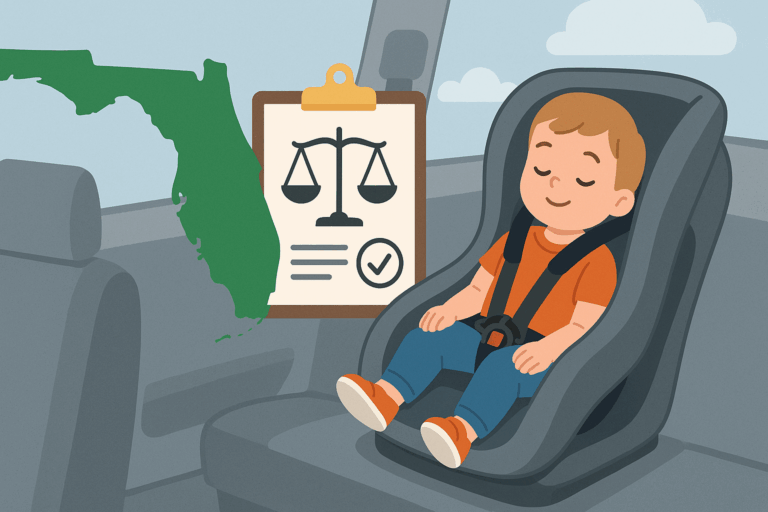The Driver’s License Compact (DLC) is an interstate agreement designed to ensure that major traffic violations committed by drivers don’t go unnoticed simply because they happened across state lines. For drivers who regularly travel across states, understanding how the DLC works and which states participate can be crucial, as a ticket received outside your home state can still impact your driving record — often with surprising consequences. Florida is a prime example of a state where out-of-state violations can lead to unexpected points on your license and even higher insurance rates.
How the Driver’s License Compact Works
The DLC is essentially an agreement that allows participating states to share information about traffic violations committed by non-resident drivers. In other words, if a driver licensed in one state gets a traffic ticket in another DLC state, that information is communicated back to the driver’s home state. The home state can then treat the out-of-state ticket as though it happened within its borders, adding points to the driver’s record or even taking more severe actions, like suspending the license.
The compact’s goal is to create uniform standards for handling traffic violations, so drivers can’t avoid penalties by simply crossing state lines. Participating states have agreed to treat major traffic offenses seriously, even if the offense occurred in another state. Key violations like speeding, reckless driving, DUIs, and failing to stop for a school bus typically result in points, penalties, and insurance rate increases, just as they would for an infraction committed locally.
Which States Participate in the Driver’s License Compact?
Forty-seven states, along with the District of Columbia, are part of the Driver’s License Compact, making it an extensive network across the country. The states that do not participate include Georgia, Michigan, and Wisconsin. These states don’t automatically share traffic violation information with other states, so out-of-state tickets may not follow a driver home quite as easily. However, even non-participating states can sometimes share information voluntarily, so drivers aren’t entirely shielded from out-of-state violations.
For drivers in most states, participation in the DLC means that tickets received elsewhere are likely to follow them back home. This can affect their driving records, lead to points on their licenses, and even impact insurance premiums.
Florida and the Driver’s License Compact
As a participating state, Florida treats out-of-state violations seriously, especially those that would carry points or penalties if committed in Florida. Let’s say a Florida resident receives a speeding ticket in New York. Once New York reports the infraction through the DLC, Florida can apply points to the driver’s license based on Florida’s point system. For instance, a ticket for speeding 15 mph or more over the limit might lead to four points on a Florida license, even though the violation occurred in New York.
Not only do these points bring drivers closer to a potential license suspension, but they can also raise insurance premiums. Insurers often increase rates based on the points accumulated on a driver’s license, regardless of where the infraction occurred. So that quick ticket while on vacation or traveling for work can cost a driver far more than the original fine. In Florida, if a driver accumulates 12 points in 12 months, their license can be suspended for 30 days. This threshold continues to grow with more points, leading to longer suspensions if violations accumulate over a few years.
Florida generally doesn’t add points for non-moving violations (such as parking tickets) received out of state, but it does apply points for most moving violations, including speeding, reckless driving, and certain other major offenses. In cases of particularly serious infractions, such as a DUI, Florida may even apply additional penalties or consider suspending the driver’s license.
Why the DLC Matters for Drivers
The Driver’s License Compact is significant because it closes a loophole that once allowed drivers to evade consequences for violations simply by driving out of state. Today, with most states on board, the DLC makes it clear that major infractions can follow you home, impacting your driving privileges and insurance costs.
Since states handle the points and penalties differently, drivers should be aware of their home state’s rules regarding out-of-state violations. In Florida, drivers can face license suspensions or increased insurance rates with as few as one or two major violations, even if those infractions were committed in other DLC states.
For drivers who receive an out-of-state ticket, contacting a traffic attorney — especially one familiar with both the state of the infraction and Florida’s point system — can often help mitigate these impacts. In many cases, an attorney can negotiate reduced charges or even contest the violation entirely, preventing points from being added to your record and keeping insurance rates in check.
In short, the Driver’s License Compact is designed to encourage responsible driving and maintain safety on the roads by holding drivers accountable, no matter where they’re driving. For Florida drivers, a ticket in another state can still count — sometimes with serious financial and legal implications that make staying informed essential.



